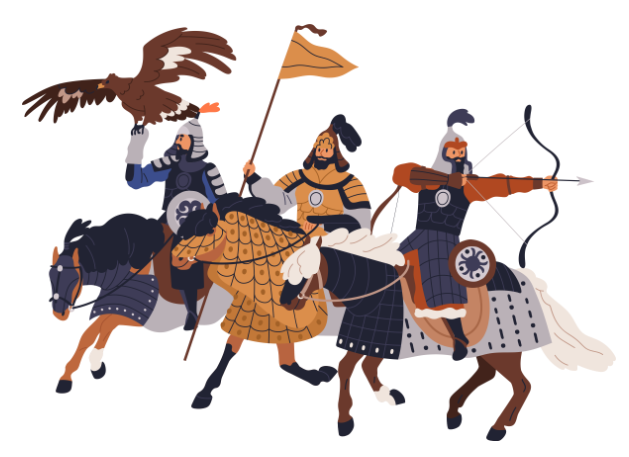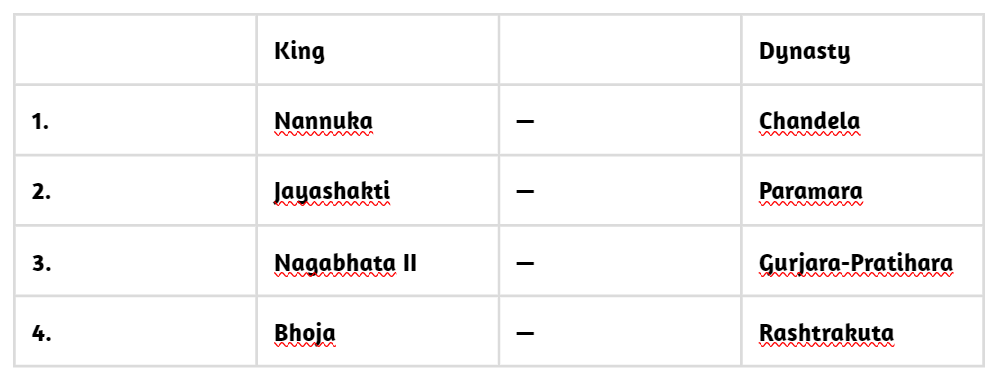![]()
1. Who among the following rulers of medieval Gujarat surrendered Diu to the Portuguese?
(a) Ahmad Shah
(b) Mahmud Begarha
(c) Bahadur Shah
(d) Muhammad Shah
![]()
1. Consider the following pairs:
![]()
How many pairs given above are correctly matched?
(a) Only one pair
(b) Only two pairs
(c) Only three pairs
(d) All four pairs
2. With reference to Indian history, who of the following were known as "Kulah-Daran"?
(a) Arab merchants
(b) Qalandars
(c) Persian calligraphists
(d) Sayyids
3. With reference to Indian history, consider the following statements:
1. The first Mongol invasion of India happened during the reign of Jalal-ud-din Khalji.
2. During the reign of Ala-ud-din Khalji, one Mongol assault marched up to Delhi and besieged the city.
3. Muhammad-bin-Tughlaq temporarily lost portions of north-west of his kingdom to Mongola.
Which of the statements given above is/are correct?
(a) 1 and 2
(b) 2 only
(c) 1 and 3
(d) 3 only
4. In medieval India, the term "Fanam" referred to:
(a) Clothing
(b) Coins
(c) Ornaments
(d) Weapons
![]()
1. Consider the following statements:
- It was during the reign of Iltutmish that Chengiz Khan reached the Indus in pursuit of the fugitive Khwarezm prince.
- It was during the reign of Muhammad-bin-Tughluq that Taimur occupied Multan and crossed the Indus.
- It was during the reign of Deva Raya II of Vijayanagara Empire that Vasco da Gama reached the coast of Kerala.
Which of the statements given above is/are correct?
(a) 1 only
(b) 1 and 2 only
(c) 3 only
(d) 2 and 3 only
2. According to the Portuguese writer Nuniz, the women in Vijayanagara Empire were expert in which of the following areas?
- Wrestling
- Astrology
- Accounting
- Soothsaying
Select the correct answer using the code given below.
(a) 1, 2 and 3 only
(b) 1, 3 and 4 only
(c) 2 and 4 only
(d) 1, 2, 3 and 4
3. With reference to medieval India, which one of the following is the correct sequence in ascending order in terms of size?
(a) Paragana-Sarkar-Suba
(b) Sarkar-Paragana-Suba
(c) Suba-Sarkar-Paragana
(d) Paragana-Suba-Sarkar
![]()
1. Consider the following statements:
- Saint Nimbarka was a contemporary of Akbar.
- Saint Kabir was greatly influenced by Shaikh Ahmad Sirhindi.
Which of the statements given above is/are correct?
(a) 1 only
(b) 2 only
(c) Both 1 and 2
(d) Neither 1 nor 2
2. Who among the following Mughal Emperors shifted emphasis from illustrated manuscripts to album and individual portrait?
(a) Humayun
(b) Akbar
(c) Jahangir
(d) Shah Jahan
3. With reference to Mughal India, what is/are the difference/differences between Jagirdar and Zamindar?
- Jagirdars were holders of land assignments in lieu of judicial and police duties, whereas Zamindars were holders of revenue rights without obligation to perform any duty other than revenue collection.
- Land assignments to Jagirdars were hereditary and revenue rights of Zamindars were not hereditary.
Select the correct answer using the code given below.
(a) 1 only
(b) 2 only
(c) Both 1 and 2
(d) Neither 1 nor 2
4. With reference to Mian Tansen, which one of the following statements is not correct?
(a) Tansen was the title given to him by Emperor Akbar.
(b) Tansen composed Dhrupads on Hindu gods and goddesses.
(c) Tansen composed songs on his patrons.
(d) Tansen invented many Ragas.
5. Consider the following statements:
- In the revenue administration of Delhi Sultanate, the in-charge of revenue collection was known as ‘Amil’.
- The lqta system of Sultans of Delhi was an ancient indigenous institution.
- The office of ‘Mir Bakshi’ came into existence during the reign of Khalji Sultans of Delhi.
Which of the statements given above is/are correct?
(a) 1 only
(b) 1 and 2 only
(c) 3 only
(d) 1, 2 and 3
![]()
1. Which one of the following foreign travelers elaborately discussed diamonds and diamond mines in India?
(a) Francois Bernier
(b) Jean-Baptiste Tavernier
(c) Jean de Thevenot
(d) Abbe Barthelemy Carre
![]()
1. Which one of the following was a very important seaport in the Kakatiya kingdom?
(a) Kakinada
(b) Motupalli
(c) Machilipatnam (Masulipatnam)
(d) Nelluru
![]()
1. With reference to the cultural history of India, the memorizing of chronicles, dynastic histories and epic tales was the profession of who of the following?
(a) Shramana
(b) Parivraajaka
(c) Agrahaarika
(d) Maagadha
2. Banjaras during the medieval period of Indian history were generally
(a) agriculturists
(b) warriors
(c) weavers
(d) traders
3. Regarding the taxation system of Krishna Deva, the ruler of Vijayanagar, consider the following statements:
- The tax rate on land was fixed depending on the quality of the land.
- Private owners of workshops paid an industries tax.
Which of the statements given above is/are correct?
(a) 1 only
(b) 2 only
(c) Both 1 and 2
(d) Neither 1 nor 2
4. With reference to the economic history of medieval India, the term ‘Araghatta’ refers to
(a) bonded labour
(b) land grants made to military officers
(c) waterwheel used in the irrigation of land
(d) wasteland converted to cultivated land
![]()
1. With reference to Indian history, which of the following is/are the essential element/elements of the feudal system?
- A very strong centralized political authority and a very weak provincial or local political authority
- Emergence of administrative structure based on control and possession of land
- Creation of lord-vassal relationship between the feudal lord and his overlord
Select the correct answer using the code given below:
(a) 1 and 2 only
(b) 2 and 3 only
(c) 3 only
(d) 1, 2 and 3
2. Who of the following founded a new city on the south bank of a tributary to river Krishna and undertook to rule his new kingdom as the agent of a deity to whom all the land south of the river Krishna was supposed to belong?
(a) Amoghavarsha I
(b) Ballala II
(c) Harihara I
(d) Prataparudra II
3. Consider the following pairs:
Medieval Indian State Present Region
- Champaka : Central India
- Durgara : Jammu
- Kuluta : Malabar
Which of the above pairs is/are correctly matched?
(a) 1 and 2
(b) 2 only
(c) 1 and 3
(d) 3 only
4. Consider the following:
The arrival of Babur into India led to the
- introduction of gunpowder in the subcontinent
- introduction of the arch and dome in the region’s architecture
- establishment of Timurid dynasty in the region
Select the correct answer using the code given below:
(a) 1 and 2 only
(b) 3 only
(c) 1 and 3 only
(d) 1, 2 and 3
![]()
1. Ibadat Khana at Fatehpur Sikri was
(a) the mosque for the use of Royal Family
(b) Akbar’s private prayer chamber
(c) the hall in which Akbar held discussions with scholars of various religions
(d) the room in which the nobles belonging to different religions gathered to discuss religious affairs
2. In medieval India, the designations 'Mahattara' and 'Pattakila' were used for
(a) military officers
(b) village headmen
(c) specialists in Vedic rituals
(d) chiefs of craft guilds
![]()
1. Consider the following Bhakti Saints:
- Dadu Dayal
- Guru Nanak
- Tyagaraja
Who among the above was/were preaching when the Lodi dynasty fell and Babur took over?
(a) 1 and 3
(b) 2 only
(c) 2 and 3
(d) 1 and 2
![]()
1. With reference to the religious history of medieval India, the Sufi mystics were known to pursue which of the following practices?
- Meditation and control of breath
- Severe ascetic exercises in a lonely place
- Recitation of holy songs to arouse a state of ecstasy in their audience
Select the correct answer using the codes given below:
(a) 1 and 2 only
(b) 2 and 3 only
(c) 3 only
(d) 1, 2 and 3











